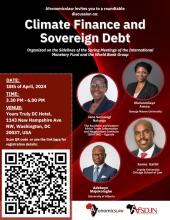Invitation - Afronomicslaw Quarterly Report Launch: The Limits of Carbon Markets as a Solution to the Climate Crisis
Join us for the launch of Afronomicslaw’s latest quarterly report, "The Limits of Carbon Markets as a Solution to the Climate Crisis" by James Thuo Gathii. This report critically examines the role of global finance in commodifying biodiversity assets and its implications for climate justice and sovereign debt in the Global South. The session will include an author presentation and a Q&A session.

